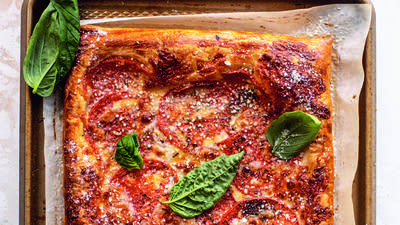
My favorite way -- we'll call it the best way -- to make iced tea is a cold-brew method. It's the easiest way to make tea in the world. You don't even need to know how to boil water.
All you do is throw some tea leaves in a pitcher or jar at bedtime, fill it full of tap water, and throw it in the fridge. Use about 2 tablespoons of tea per half gallon of water. Put the leaves in a strainer or a filter bag. In the morning, voila, you have a whole pitcher full of iced tea.
You never even heat the water. It extracts the flavor over the course of the evening while you're sleeping, and in the morning you have beautiful iced tea.
An ice-brewed tea will be a little bit softer. It will be a little bit gentler. It comes out so beautifully smooth. It has no edge to it whatsoever.
You can get more of an edge if you like an edge. If you like astringency, brew hot tea. If you like a really strong tea with a little bit of a bite, I would choose a ceylon tea or an Indian tea. Do it with a hot brew method; then cool it down afterward.
But I'll tell you, the cold brew is what got my wife off of Diet Pepsi every morning as she left for work. She'd just make a pitcher of iced tea at night.
This method works for all teas. Green teas are tough to brew for iced tea with hot water because it's so easy to turn green teas bitter with water that's too hot. That's why they're perfect for the cold-brew method.
It will keep easily 3 to 4 days.
Sun tea is a great concept, except for the idea of the sun. Because what you're doing is you're taking wet vegetable matter, which is a tea leaf, throwing it into a pitcher and throwing it out in the sun for 8 hours. I've had a lab scientist tell me once that's what they do when they want to grow bacteria. Cold-brew iced tea is the perfect answer because it's the same mechanics, except you're putting the pitcher in the refrigerator instead of the sun.
[More from Waddington on China's dark tea and white tea.]
Before you go...
Each week, The Splendid Table brings you stories that expand your world view, inspire you to try something new, and show how food connects us all. We rely on your generous support. For as little as $5 a month, you can have a lasting impact on The Splendid Table. And, when you donate, you’ll join a community of like-minded individuals who love good food, good conversation, and kitchen companionship. Show your love for The Splendid Table with a gift today.
Thank you for your support.
Donate today for as little as $5.00 a month. Your gift only takes a few minutes and has a lasting impact on The Splendid Table and you'll be welcomed into The Splendid Table Co-op.



